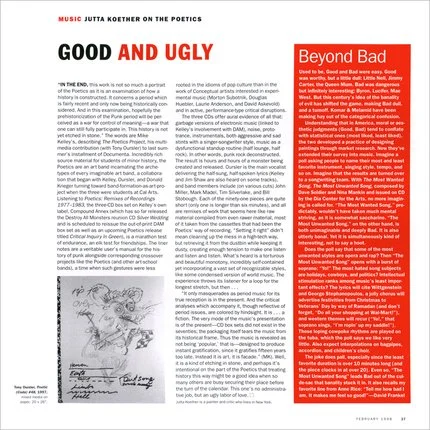jutta koether on the poetics
“IN THE END, this work is not so much a portrait of the Poetics as it is an examination of how a history is constructed. It concerns a period which is fairly recent and only now being historically considered. And in this examination, hopefully the prehistoricization of the Punk period will be perceived as a war for control of meaning—a war that one can still fully participate in. This history is not yet etched in stone.” The words are Mike Kelley’s, describing The Poetics Project, his multimedia contribution (with Tony Oursler) to last summer’s installment of Documenta. Incredibly rich source material for students of minor history, the Poetics are an art band incarnating the archetypes of every imaginable art band, a collaboration that began with Kelley, Oursler, and Donald Krieger turning toward band-formation-as-art-project when the three were students at Cal Arts. Listening to Poetics: Remixes of Recordings 1977–1983, the three-CD box set on Kelley’s own label, Compound Annex (which has so far released the Destroy All Monsters reunion CD Silver Wedding and is scheduled to reissue the out-of-print DAM box set as well as an upcoming Poetics release titled Critical Inquiry In Green), is a marathon test of endurance, an elk test for friendships. The liner notes are a veritable user’s manual for the history of punk alongside corresponding crossover projects like the Poetics (and other art-school bands), a time when such gestures were less rooted in the idioms of pop culture than in the work of Conceptual artists interested in experimental music (Morton Subotnik, Douglas Huebler, Laurie Anderson, and David Askevold) and in active, performance-type critical disruptions.
The three CDs offer aural evidence of all that: garbage versions of electronic music (linked to Kelley’s involvement with DAM), noise, proto-trance, instrumentals, both aggressive and sad stints with a singer-songwriter style, music as a dysfunctional standup routine (half lounge, half rock). In other words, punk rock deconstructed. The result is hours and hours of a monster being created and released. Oursler is the main vocalist delivering the half-sung, half-spoken lyrics (Kelley and Jim Shaw are also heard on some tracks),. and band members include (on various cuts) John Miller, Mark Madel, Tim Silverlake, and Bill Stobough. Each of the ninety-one pieces are quite short (only one is longer than six minutes), and all are remixes of work that seems here like raw material compiled from even rawer material, most of it taken from the cassettes that had been the Poetics’ way of recording. “Setting it right” didn’t mean cleaning up the mess in a high-tech way, but retrieving it from the dustbin while keeping it dusty, creating enough tension to make one listen and listen and listen. What’s heard is a torturous and beautiful monotony, incredibly self-contained yet incorporating a vast set of recognizable styles, like some condensed version of world music. The experience throws its listener for a loop for the longest stretch, but then . . .
“It only masquerades as period music for its true reception is in the present. And the critical analyses which accompany it, though reflective of period issues, are colored by hindsight. It is . . . a fiction. The very mode of the music’s presentation is of the present—CD box sets did not exist in the seventies; the packaging itself tears the music from its historical frame. Thus the music is revealed as not being ‘popular,’ that is—designed to produce instant gratification, since it gratifies fifteen years too late. Instead it is art, it is facade.” (MK). Well, it is a kind of etching in stone, and perhaps it’s intentional on the part of the Poetics that treating history this way might be a good idea when so many others are busy securing their place before the turn of the calendar. This one’s no administrative job, but an ugly labor of love.
Jutta Koether is a painter and critic who lives in New York.
